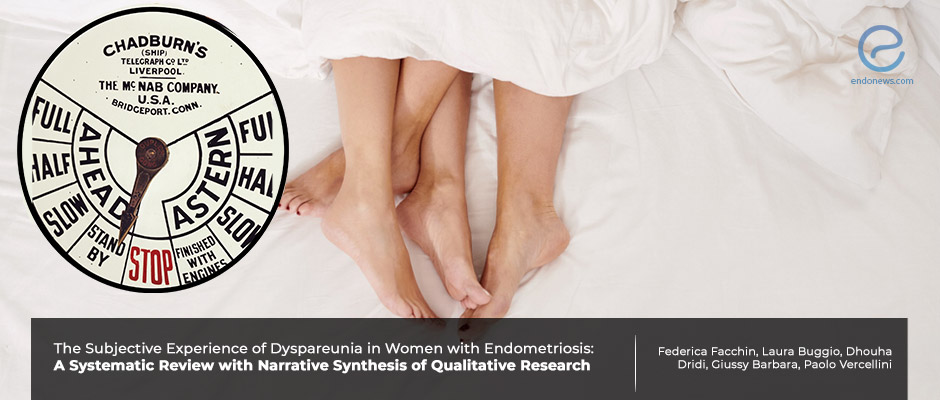Pain During Sex in Women With Endometriosis
Jan 6, 2022
This study explores women’s subjective experience with dyspareunia, how it affects them, and how they deal with it.
Key Points
Highlights:
- Endometriosis-related dyspareunia manifests itself in multiple forms.
- Women with endometriosis-related dyspareunia use multiple strategies to cope with the pain.
- The sexual health of women with endometriosis should be routinely assessed during counseling.
Importance:
- Women with endometriosis should be offered targeted strategies to enjoy sex. This could significantly improve their psychological health and quality of life.
What's done here:
- Researchers conducted a systematic review of 17 qualitative research articles focusing on the subjective experience of women with endometriosis about dyspareunia, their coping strategies, and its effect on their psychological health and relationship.
- Only qualitative studies written in English were included, without publication time restriction.
- Total 17 articles included, the number of women with endometriosis was ranging between [12-74] and the total was 456.
Key results:
- Endometriosis-related dyspareunia can be deep, introital, and/or positional, and occur at orgasm and during and/or after intercourse.
- Women cope with dyspareunia by interrupting or avoiding intercourse, enduring the pain, and/or finding other ways to enjoy sexuality.
Limitations:
- Only a small number of studies were available on the subject to be included here.
- The samples were homogeneous and consisted mostly of young adult premenopausal women in heterosexual relationships so the findings cannot be generalized to everyone with the disease.
- Not all cases of endometriosis were diagnosed surgically
Lay Summary
Pain during intercourse or dyspareunia due to endometriosis manifests itself in multiple forms such as deep, introital, and/or positional. Pain can also occur at orgasm and during and/or after intercourse. These are the findings of a systemic literature review published in the International Journal of Environmental Research and Public Health.
“Dyspareunia impairs women's psychological health, especially in terms of poor self-esteem and sense of femininity, and has negative consequences on intimate relationships,” the researchers wrote. However, despite this, both women and their doctors are often unwilling to talk about sexual issues.
Dyspareunia is one of the main symptoms of endometriosis. But little is known about women’s subjective experience of dyspareunia.
Here, a team of researchers led by Paolo Vercellini MD, Professor of Obstetrics and Gynaecology, Department of Clinical Sciences and Community Health, Università degli Studi di Milano in Italy conducted a systematic review of qualitative research to explore women's lived experience of painful intercourse.
They included 17 published studies and focused on how women perceive and describe the pain they experience, how they deal with the pain, and how it affects their psychological health and relationship.
They reported that women use different strategies to cope with the pain. These include interrupting or avoiding intercourse, enduring the pain, and/or finding other ways to enjoy their sexuality.
The researchers suggested that sexual health should be assessed routinely during the counseling of women with endometriosis. “Helping women find targeted strategies to enjoy sexuality despite endometriosis may significantly improve their psychological health and quality of life,” they said.
Research Source: https://pubmed.ncbi.nlm.nih.gov/34831868/
Dyspareunia systematic review coping strategy

